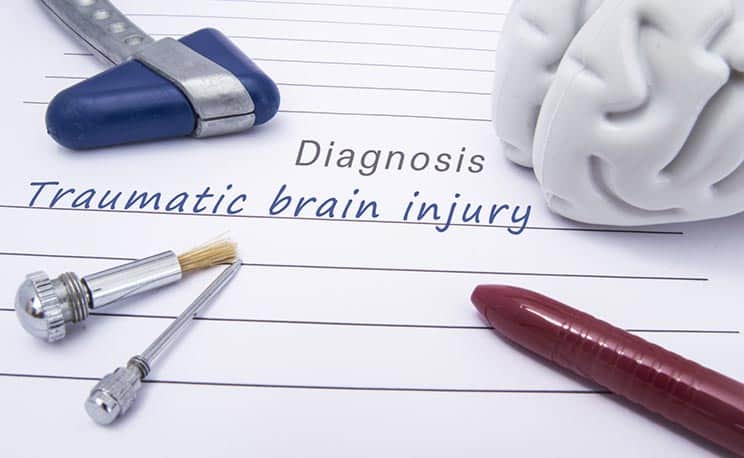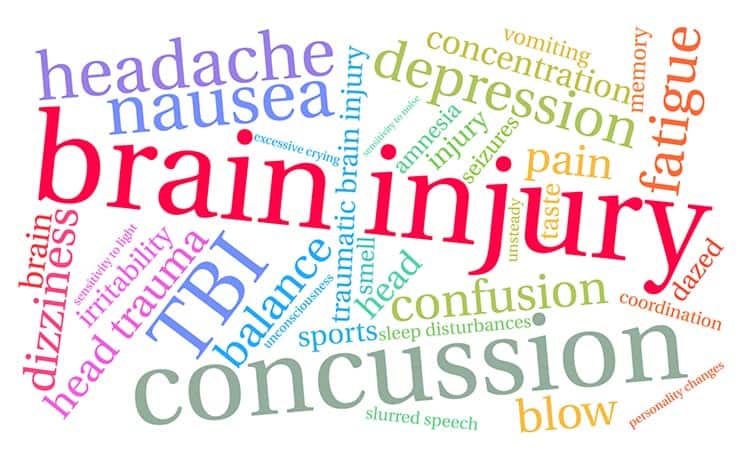What is a Traumatic Brain Injury?
A traumatic brain injury refers to damage to brain tissue typically resulting from a blow, jolt, or penetrating head injury. In cases other than penetrating injuries, the external force of an impact causes the brain to collide with the interior of the skull or to rotate within the skull, resulting in tissue damage. TBIs often consist of a primary injury – the bruising and tearing of brain tissue inflicted by the initial violent force, and a secondary injury – the damage to brain tissue that happens after the initial injury, often as a result of intracranial bleeding and loss of blood flow and swelling.
Categories of Traumatic Brain Injuries
The medical and brain injury research communities generally classify traumatic brain injury by severity: as mild, moderate, or severe. The injury is usually classified based upon criteria that include:
- The patient’s post-injury neurologic functioning
- The appearance of the injury on a brain scan image
- The duration of loss of consciousness
- Post-injury memory loss
- The patient’s chance of survival

In the section below, The Law Center reviews each severity classification. Any TBI diagnosis, even for a mild injury, merits consultation with an experienced traumatic brain injury lawyer about your rights to compensation.
Mild Traumatic Brain Injury
A so-called mild traumatic brain injury, also known as a concussion, does not feature noticeable damage on a CT-scan image, involves loss of consciousness of less than 30 minutes, less than one day of memory loss, and relatively minor neurological impairment. A mild TBI can nevertheless leave a victim with an assortment of unpleasant and severe symptoms, including:
- Persistent headaches
- Fatigue
- Cognitive problems (such as brain fog)
- Light sensitivity
- Ringing in the ears
- Faulty memory
- Irritability
- Anxiety
- Depression

Moderate Traumatic Brain Injury
A moderate traumatic brain injury may or may not show up on a brain scan image, involves a loss of consciousness between 30 minutes and 24 hours, memory loss of between one and seven days, and potentially significant neurological impairment. A victim of moderate TBI can suffer all the symptoms of a mild TBI listed above, as well as more severe impairments such as:
- Numbness and weakness in appendages
- Slurred speech
- Vision problems
- Motor difficulties
Severe Traumatic Brain Injury
A severe traumatic brain injury appears clearly on a brain scan, involves loss of consciousness of more than 24 hours, more than seven days of post-injury amnesia, and significant debilitating neurological impairment. A severe TBI victim can suffer from all symptoms displayed by people with mild and moderate traumatic brain injuries, as well as:
A severe traumatic brain injury appears clearly on a brain scan, involves loss of consciousness of more than 24 hours, more than seven days of post-injury amnesia, and significant debilitating neurological impairment. A severe TBI victim can suffer from all symptoms displayed by people with mild and moderate traumatic brain injuries, as well as:
- Long lasting loss of consciousness
- Profound changes in mood, affect, and cognition
- Permanent motor disability

Common Causes of Traumatic Brain Injuries
Traumatic brain injuries can happen in connection with any blow, jolt, or penetrating head injury, but frequently involve the following circumstances listed and detailed below.
Traumatic Brain Injuries from Motor Vehicle Accidents
Motor vehicle accidents constitute a leading cause of fatal and non-fatal traumatic brain injury in the United States. TBIs in traffic accidents typically happen because a vehicle occupant’s head strikes the interior of the vehicle or sustains a severe jolt in the impact of a collision.
Traumatic Brain Injuries from Falls
Falls also represent a leading cause of fatal and non-fatal traumatic brain injuries, especially in older people. Even a relatively minor fall can result in a person sustaining a significant brain injury.
Traumatic Brain Injuries from Injuries Sustained in the Military
Research has established that the concussive force of explosions and weapon discharges can lead to traumatic brain injury in soldiers during combat or in training scenarios. A soldier need not have sustained visible physical injury to suffer a potentially severe brain injury.
Traumatic Brain Injuries from Violence & Self-Inflicted Injury
Acts of violence, particularly gunshot wounds, account for a significant percentage of fatal traumatic brain injuries in the United States every year. Self-inflicted gunshot wounds comprise the bulk of these.
Traumatic Brain Injuries from Sports Injuries
Collisions in sports activities constitute a leading cause of mild traumatic brain injury or concussions. However, when those injuries occur repeatedly over time, like is common in the game of football, those seemingly mild TBIs can turn into more serious injuries.

Traumatic Brain Injury Lawsuits
Victims of traumatic brain injury may have the right to take legal action seeking compensation from anyone whose reckless decisions or actions caused them harm. A lawsuit seeking damages for a traumatic brain injury will typically make one of the following types of claims:
Traumatic Brain Injury Due to Negligence
All individuals and corporate entities owe the public a duty of care not to act in a manner that puts others at an unreasonable risk of harm. The law deems anyone who violates that duty through careless, reckless, or intentionally harmful decisions or actions as negligent, and imposes legal liability on them for damages.
Traumatic Brain Injury Due to Product Liability
Manufacturers of the consumer goods we use in our everyday lives, from medicines to automobiles to kitchen appliances, have a special duty not to sell products that pose an unreasonable danger of causing harm to users. A product deemed defective in its design, in how it was manufactured, or in its absence of adequate warnings to users, saddles its manufacturer with potential legal liability to anyone the product harms when used for its ordinary purpose.

Leading Traumatic Brain Injury Lawyers
Due to the complex nature of the brain and TBIs, traumatic brain injury lawsuits can be incredibly intricate and overwhelming to navigate on your own. Expert traumatic brain injury lawyers possess a deep understanding of the medical issues and complications typical of TBIs and their lawsuits. Hiring experienced traumatic brain injury attorneys will allow you to rest assured that your TBI case has the necessary substantial legal backing to obtain the maximum compensation for your injuries and losses.
The Law Center
The Law Center connects traumatic brain injury victims and their loved ones with the local experts who have the knowledge and experience necessary to pursue successful claims against anyone who caused them harm. Call 866-465-1419 or fill out the form below to learn about how we can assist you in connecting with the top traumatic brain injury lawyer in your area.
Sources
- https://www.cdc.gov/traumaticbraininjury/pdf/TBI_Report_to_Congress_Epi_and_Rehab-a.pdf
- https://www.mayoclinic.org/diseases-conditions/traumatic-brain-injury/symptoms-causes/syc-20378557
- https://www.forbes.com/sites/kenrickcai/2019/07/18/teen-two-pod-a-day-juul-addiction-caused-massive-stroke-lawsuit-vaping-e-cigarettes/#46ffb7976ace
- https://www.ahajournals.org/doi/10.1161/str.50.suppl_1.9
- https://www.ajpmonline.org/article/S0749-3797(19)30468-4/fulltext#seccesectitle0012
- https://www.cdc.gov/traumaticbraininjury/get_the_facts.html